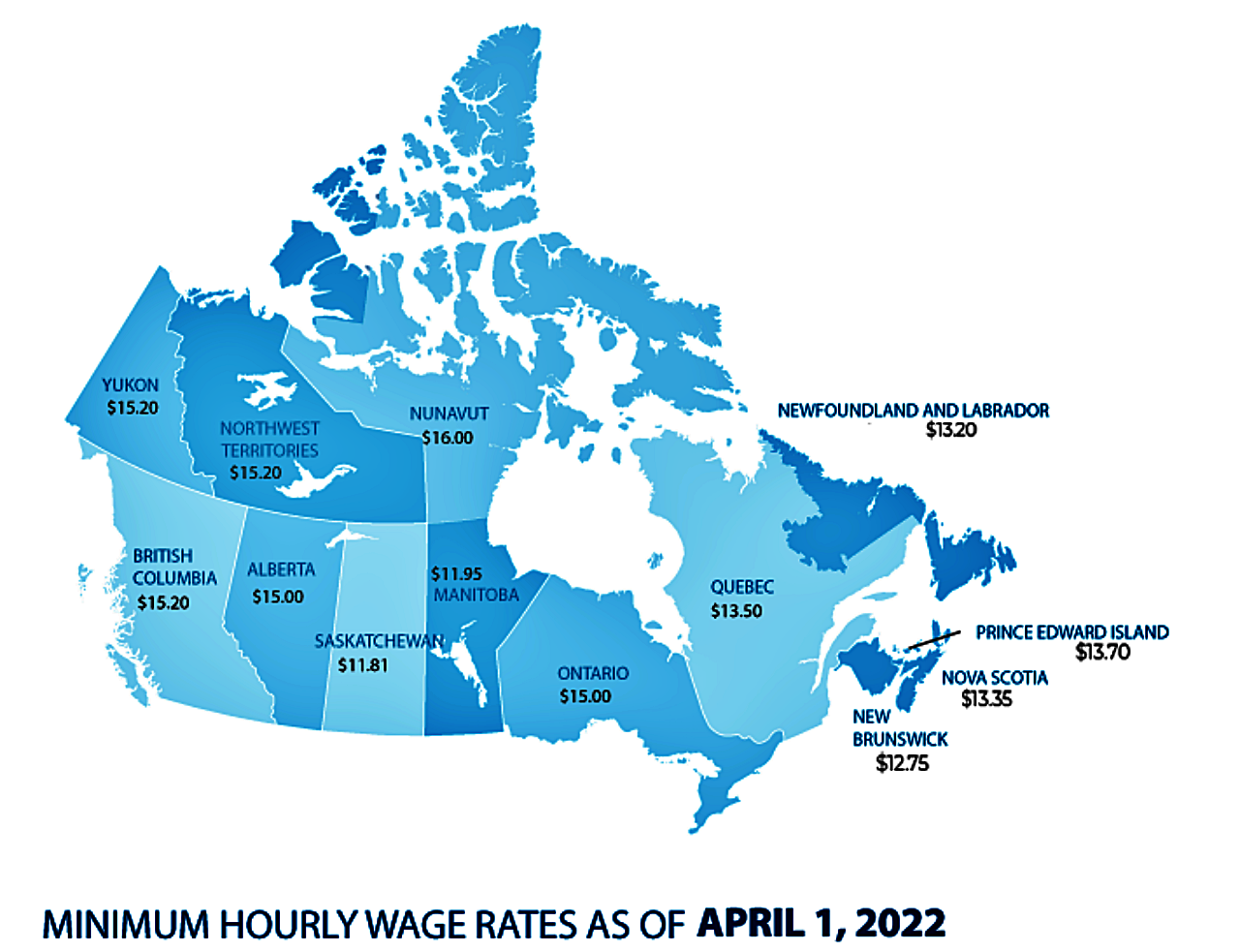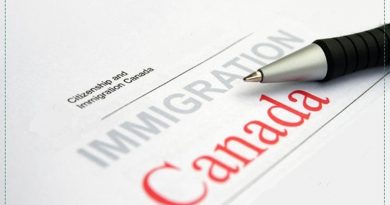New Policy: Federal Minimum Wage Rising on April 1, 2023
From: Employment and Social Development Canada
News release
March 21, 2023 Gatineau, Quebec Employment and Social Development Canada
Table: Canadian Federal and Provincial Minimum Hourly Wages from 2019 to 2024
| Jurisdiction | Effective Date | Wage Rate | Note |
|---|---|---|---|
| Federal | 01-Apr-2023 | $16.65 | An employee should be paid at least the federal minimum wage. If the minimum wage of the province or territory where the employee usually works is higher than the federal minimum wage, the employer is to pay the higher minimum wage. |
| Federal | 01-Apr-2022 | $15.55 | An employee should be paid at least the federal minimum wage. If the minimum wage of the province or territory where the employee usually works is higher than the federal minimum wage, the employer is to pay the higher minimum wage. |
| Alberta | 26-Jun-2019 | $15.00 | |
| British Columbia | 01-Jun-2022 | $15.65 | |
| Manitoba | 01-Oct-2022 | $13.50 | |
| Manitoba | 01-Apr-2023 | $14.15 | |
| Manitoba | 01-Oct-2023 | $15.00 | |
| New Brunswick | 01-Oct-2022 | $13.75 | |
| New Brunswick | 01-Apr-2023 | $14.75 | |
| Newfoundland and Labrador | 01-Oct-2022 | $13.70 | |
| Newfoundland and Labrador | 01-Apr-2023 | $14.50 | |
| Newfoundland and Labrador | 01-Oct-2023 | $15.00 | |
| Northwest Territories | 01-Sep-2021 | $15.20 | |
| Nova Scotia | 01-Oct-2022 | $13.60 | |
| Nova Scotia | 01-Apr-2023 | $14.50 | |
| Nova Scotia | 01-Oct-2023 | $15.00 | |
| Nunavut | 01-Apr-2020 | $16.00 | |
| Ontario | 01-Oct-2022 | $15.50 | |
| Prince Edward Island | 01-Jan-2023 | $14.50 | |
| Prince Edward Island | 01-Oct-2023 | $15.00 | |
| Quebec | 01-May-2022 | $14.25 | |
| Saskatchewan | 01-Oct-2022 | $13.00 | |
| Saskatchewan | 01-Oct-2023 | $14.00 | |
| Saskatchewan | 01-Oct-2024 | $15.00 | |
| Yukon | 01-Apr-2022 | $15.70 | |
| Yukon | 01-Apr-2023 | $16.77 |
Every Canadian deserves a real and fair chance at success. Yet some Canadian workers still struggle financially while working part-time, temporary and low- or minimum-wage jobs.
To keep pace with inflation, the federal minimum wage will increase from $15.55 to $16.65 per hour on April 1, 2023. Based on the Consumer Price Index, which rose 6.8% in 2022, the increase will help make life more affordable for the approximately 26,000 Canadian workers who earn less than the current rate.
Federally regulated private-sector employers must adjust their payroll information with the new rate to ensure workers and interns are paid correctly as of April 1. Where the provincial or territorial minimum wage rate is higher than the federal minimum wage, employers must apply the higher rate.
The federal minimum wage applies to the federally regulated private sectors, including banks, postal and courier services, and interprovincial air, rail, road, and marine transportation.
For more information, consult Pay and minimum wage, deductions, and wage recovery or contact the Labour Program at 1-800-641-4049.

Quotes
“The cost of living is rising, so we’re making sure that wages keep going up too. We’re looking after workers, because that’s how you grow the economy and create more prosperity for everyone.”
– Minister of Labour, Seamus O’Regan Jr.
Quick facts
- Part III (Labour Standards) of the Canada Labour Code was amended to establish a federal minimum wage of $15 per hour rising with inflation. The measure came into force on December 29, 2021. Every April 1, the federal minimum wage is adjusted based on Canada’s Consumer Price Index (previous calendar year). The first adjustment took place on April 1, 2022.
- This change applies to workers and interns in federally regulated private sectors, including banks, postal and courier services, and interprovincial air, rail, road and marine transportation. The federal minimum wage directly benefits an estimated 26,000 workers in these sectors who earn less than the current rate.
- In recent years, the Government has been working on many fronts to help ensure every Canadian has a fair and equal chance to reach their full potential and have decent working conditions. Measures taken include:
- the coming into force of the Pay Equity Act and Pay Equity Regulations so that workers receive equal pay for work of equal value;
- the ongoing development of a right-to-disconnect policy to help improve work-life balance by setting clear expectations around
- the use of electronic devices after the work day; and
- a commitment to advancing amendments to the Canada Labour Code that would:
- include mental health as a specific element of occupational health and safety; and
- entitle gig workers (including those employed by digital platforms) to labour protections.
The provincial minimum wage can be lower than the federal minimum wage if the province’s minimum wage laws allow for it. In Canada, each province and territory has its own minimum wage laws, which are set by their respective governments.
However, if a federally regulated employee (such as those in the banking, telecommunications, and interprovincial transportation industries) is paid less than the federal minimum wage, it would be considered illegal under federal law.
Pages: 1 2





